Business Ethics and Responsible Management Report: Tuna Case Study
VerifiedAdded on 2023/01/18
|11
|3706
|61
Report
AI Summary
This report delves into the realm of business ethics, using the tuna industry as a case study to examine complex ethical issues. It begins with an introduction to business ethics, defining its scope and significance in organizational contexts. The main body of the report is divided into two parts. Part 1 explores the importance of business ethics, analyzing the ethical dilemmas presented in the tuna industry case, the role of businesses within society, and the impact on stakeholders, offering recommendations for ethical improvements. It also addresses ethical leadership and management within an unethical organizational culture. Part 2 presents a reflective essay from the perspective of an ethical leader, discussing leadership qualities and decision-making processes. The report concludes with a summary of the findings and provides references to support the analysis. The report emphasizes the importance of ethical standards and practices in the business world, particularly in industries with complex supply chains and potential human rights abuses. The report provides a comprehensive overview of business ethics, addressing theoretical frameworks and practical implications.
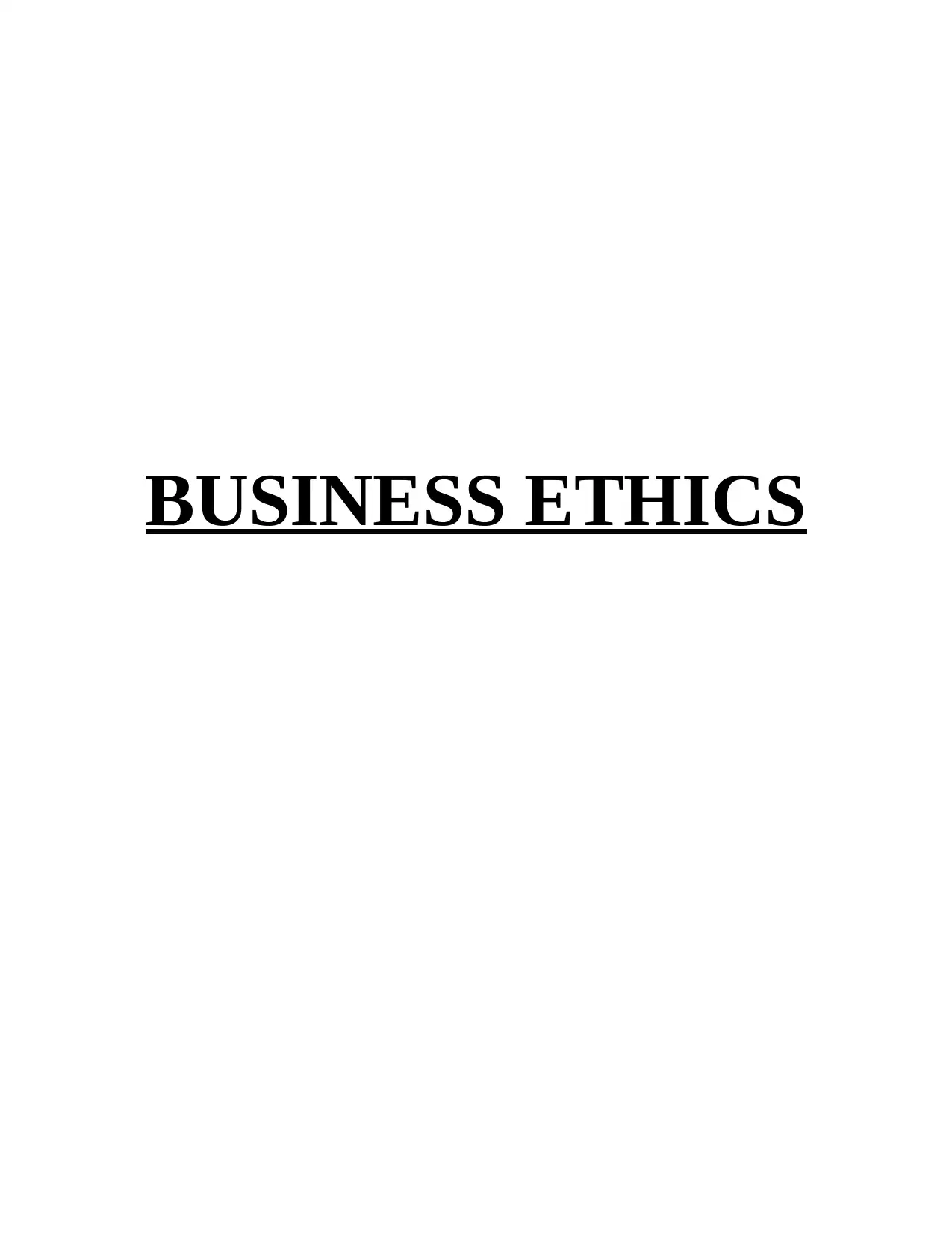
BUSINESS ETHICS
Paraphrase This Document
Need a fresh take? Get an instant paraphrase of this document with our AI Paraphraser
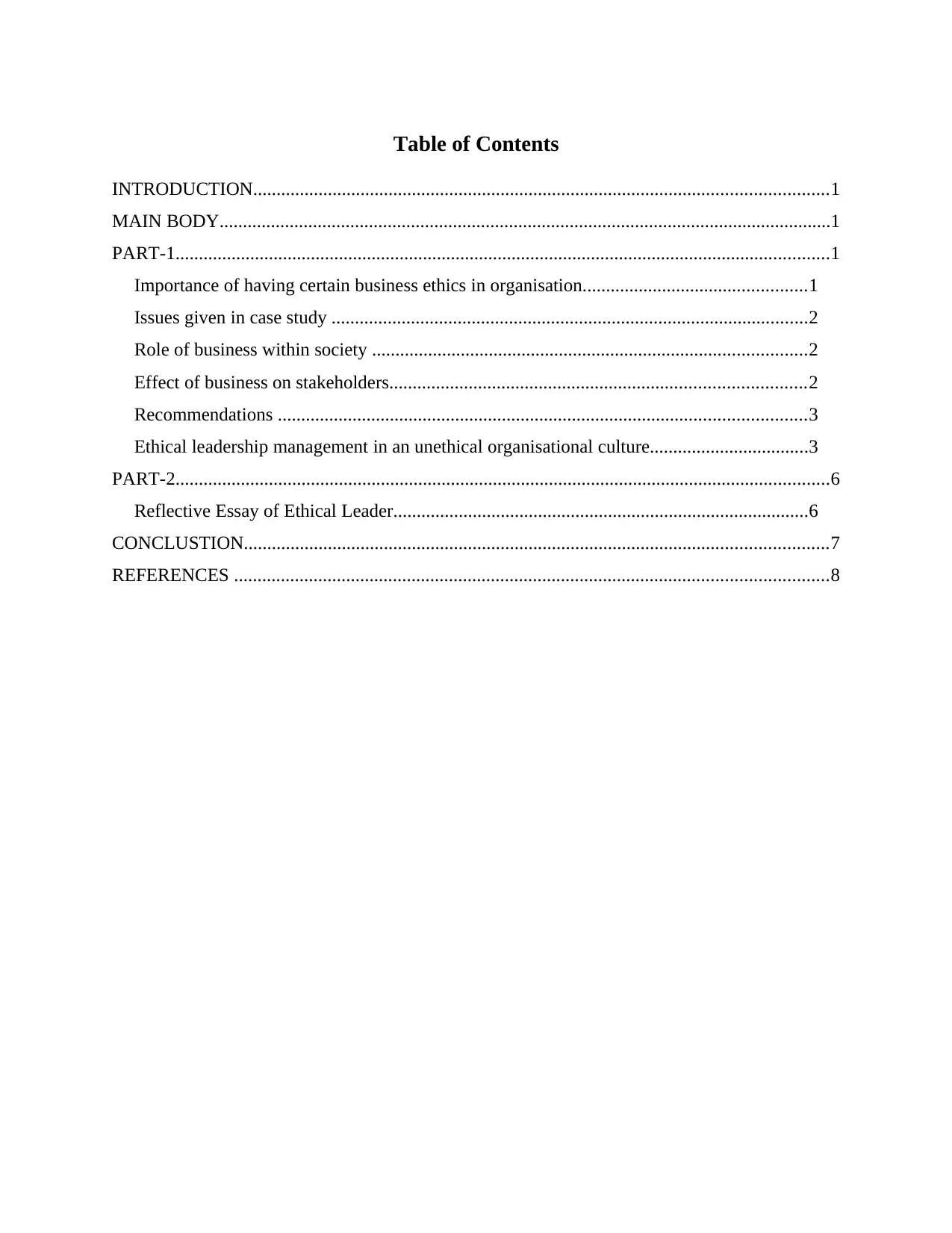
Table of Contents
INTRODUCTION...........................................................................................................................1
MAIN BODY...................................................................................................................................1
PART-1............................................................................................................................................1
Importance of having certain business ethics in organisation................................................1
Issues given in case study ......................................................................................................2
Role of business within society .............................................................................................2
Effect of business on stakeholders.........................................................................................2
Recommendations .................................................................................................................3
Ethical leadership management in an unethical organisational culture..................................3
PART-2............................................................................................................................................6
Reflective Essay of Ethical Leader.........................................................................................6
CONCLUSTION.............................................................................................................................7
REFERENCES ...............................................................................................................................8
INTRODUCTION...........................................................................................................................1
MAIN BODY...................................................................................................................................1
PART-1............................................................................................................................................1
Importance of having certain business ethics in organisation................................................1
Issues given in case study ......................................................................................................2
Role of business within society .............................................................................................2
Effect of business on stakeholders.........................................................................................2
Recommendations .................................................................................................................3
Ethical leadership management in an unethical organisational culture..................................3
PART-2............................................................................................................................................6
Reflective Essay of Ethical Leader.........................................................................................6
CONCLUSTION.............................................................................................................................7
REFERENCES ...............................................................................................................................8

⊘ This is a preview!⊘
Do you want full access?
Subscribe today to unlock all pages.

Trusted by 1+ million students worldwide
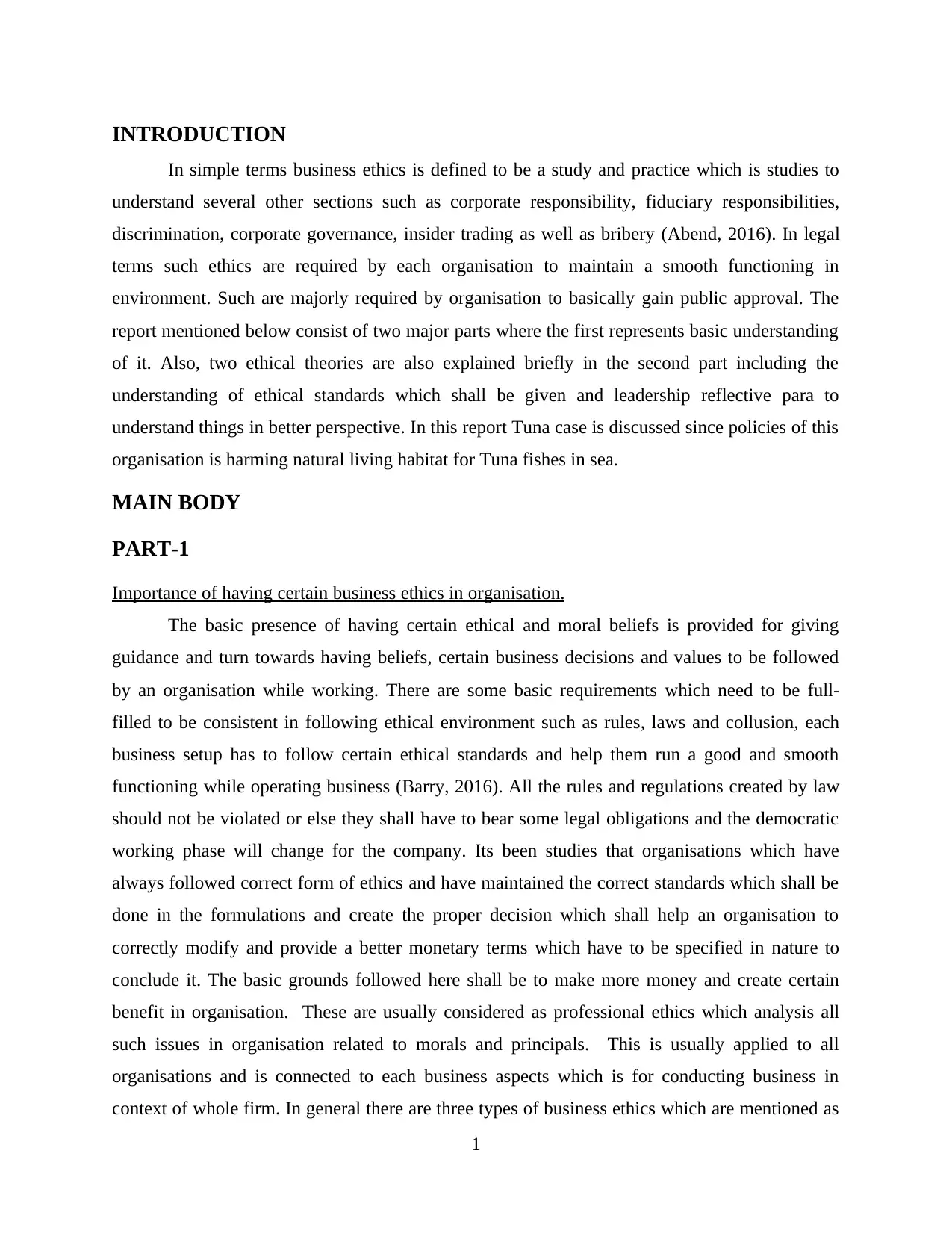
INTRODUCTION
In simple terms business ethics is defined to be a study and practice which is studies to
understand several other sections such as corporate responsibility, fiduciary responsibilities,
discrimination, corporate governance, insider trading as well as bribery (Abend, 2016). In legal
terms such ethics are required by each organisation to maintain a smooth functioning in
environment. Such are majorly required by organisation to basically gain public approval. The
report mentioned below consist of two major parts where the first represents basic understanding
of it. Also, two ethical theories are also explained briefly in the second part including the
understanding of ethical standards which shall be given and leadership reflective para to
understand things in better perspective. In this report Tuna case is discussed since policies of this
organisation is harming natural living habitat for Tuna fishes in sea.
MAIN BODY
PART-1
Importance of having certain business ethics in organisation.
The basic presence of having certain ethical and moral beliefs is provided for giving
guidance and turn towards having beliefs, certain business decisions and values to be followed
by an organisation while working. There are some basic requirements which need to be full-
filled to be consistent in following ethical environment such as rules, laws and collusion, each
business setup has to follow certain ethical standards and help them run a good and smooth
functioning while operating business (Barry, 2016). All the rules and regulations created by law
should not be violated or else they shall have to bear some legal obligations and the democratic
working phase will change for the company. Its been studies that organisations which have
always followed correct form of ethics and have maintained the correct standards which shall be
done in the formulations and create the proper decision which shall help an organisation to
correctly modify and provide a better monetary terms which have to be specified in nature to
conclude it. The basic grounds followed here shall be to make more money and create certain
benefit in organisation. These are usually considered as professional ethics which analysis all
such issues in organisation related to morals and principals. This is usually applied to all
organisations and is connected to each business aspects which is for conducting business in
context of whole firm. In general there are three types of business ethics which are mentioned as
1
In simple terms business ethics is defined to be a study and practice which is studies to
understand several other sections such as corporate responsibility, fiduciary responsibilities,
discrimination, corporate governance, insider trading as well as bribery (Abend, 2016). In legal
terms such ethics are required by each organisation to maintain a smooth functioning in
environment. Such are majorly required by organisation to basically gain public approval. The
report mentioned below consist of two major parts where the first represents basic understanding
of it. Also, two ethical theories are also explained briefly in the second part including the
understanding of ethical standards which shall be given and leadership reflective para to
understand things in better perspective. In this report Tuna case is discussed since policies of this
organisation is harming natural living habitat for Tuna fishes in sea.
MAIN BODY
PART-1
Importance of having certain business ethics in organisation.
The basic presence of having certain ethical and moral beliefs is provided for giving
guidance and turn towards having beliefs, certain business decisions and values to be followed
by an organisation while working. There are some basic requirements which need to be full-
filled to be consistent in following ethical environment such as rules, laws and collusion, each
business setup has to follow certain ethical standards and help them run a good and smooth
functioning while operating business (Barry, 2016). All the rules and regulations created by law
should not be violated or else they shall have to bear some legal obligations and the democratic
working phase will change for the company. Its been studies that organisations which have
always followed correct form of ethics and have maintained the correct standards which shall be
done in the formulations and create the proper decision which shall help an organisation to
correctly modify and provide a better monetary terms which have to be specified in nature to
conclude it. The basic grounds followed here shall be to make more money and create certain
benefit in organisation. These are usually considered as professional ethics which analysis all
such issues in organisation related to morals and principals. This is usually applied to all
organisations and is connected to each business aspects which is for conducting business in
context of whole firm. In general there are three types of business ethics which are mentioned as
1
Paraphrase This Document
Need a fresh take? Get an instant paraphrase of this document with our AI Paraphraser
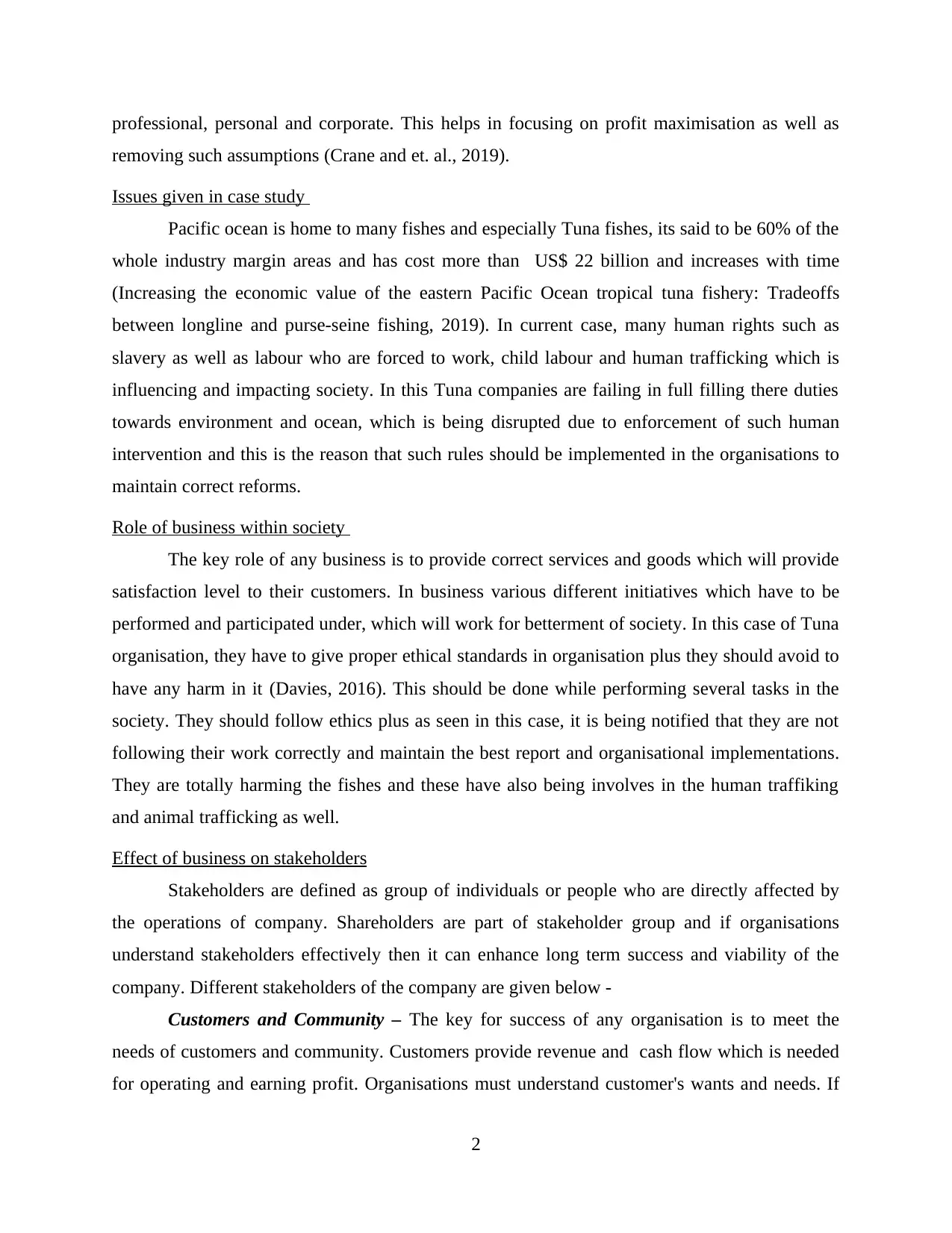
professional, personal and corporate. This helps in focusing on profit maximisation as well as
removing such assumptions (Crane and et. al., 2019).
Issues given in case study
Pacific ocean is home to many fishes and especially Tuna fishes, its said to be 60% of the
whole industry margin areas and has cost more than US$ 22 billion and increases with time
(Increasing the economic value of the eastern Pacific Ocean tropical tuna fishery: Tradeoffs
between longline and purse-seine fishing, 2019). In current case, many human rights such as
slavery as well as labour who are forced to work, child labour and human trafficking which is
influencing and impacting society. In this Tuna companies are failing in full filling there duties
towards environment and ocean, which is being disrupted due to enforcement of such human
intervention and this is the reason that such rules should be implemented in the organisations to
maintain correct reforms.
Role of business within society
The key role of any business is to provide correct services and goods which will provide
satisfaction level to their customers. In business various different initiatives which have to be
performed and participated under, which will work for betterment of society. In this case of Tuna
organisation, they have to give proper ethical standards in organisation plus they should avoid to
have any harm in it (Davies, 2016). This should be done while performing several tasks in the
society. They should follow ethics plus as seen in this case, it is being notified that they are not
following their work correctly and maintain the best report and organisational implementations.
They are totally harming the fishes and these have also being involves in the human traffiking
and animal trafficking as well.
Effect of business on stakeholders
Stakeholders are defined as group of individuals or people who are directly affected by
the operations of company. Shareholders are part of stakeholder group and if organisations
understand stakeholders effectively then it can enhance long term success and viability of the
company. Different stakeholders of the company are given below -
Customers and Community – The key for success of any organisation is to meet the
needs of customers and community. Customers provide revenue and cash flow which is needed
for operating and earning profit. Organisations must understand customer's wants and needs. If
2
removing such assumptions (Crane and et. al., 2019).
Issues given in case study
Pacific ocean is home to many fishes and especially Tuna fishes, its said to be 60% of the
whole industry margin areas and has cost more than US$ 22 billion and increases with time
(Increasing the economic value of the eastern Pacific Ocean tropical tuna fishery: Tradeoffs
between longline and purse-seine fishing, 2019). In current case, many human rights such as
slavery as well as labour who are forced to work, child labour and human trafficking which is
influencing and impacting society. In this Tuna companies are failing in full filling there duties
towards environment and ocean, which is being disrupted due to enforcement of such human
intervention and this is the reason that such rules should be implemented in the organisations to
maintain correct reforms.
Role of business within society
The key role of any business is to provide correct services and goods which will provide
satisfaction level to their customers. In business various different initiatives which have to be
performed and participated under, which will work for betterment of society. In this case of Tuna
organisation, they have to give proper ethical standards in organisation plus they should avoid to
have any harm in it (Davies, 2016). This should be done while performing several tasks in the
society. They should follow ethics plus as seen in this case, it is being notified that they are not
following their work correctly and maintain the best report and organisational implementations.
They are totally harming the fishes and these have also being involves in the human traffiking
and animal trafficking as well.
Effect of business on stakeholders
Stakeholders are defined as group of individuals or people who are directly affected by
the operations of company. Shareholders are part of stakeholder group and if organisations
understand stakeholders effectively then it can enhance long term success and viability of the
company. Different stakeholders of the company are given below -
Customers and Community – The key for success of any organisation is to meet the
needs of customers and community. Customers provide revenue and cash flow which is needed
for operating and earning profit. Organisations must understand customer's wants and needs. If
2
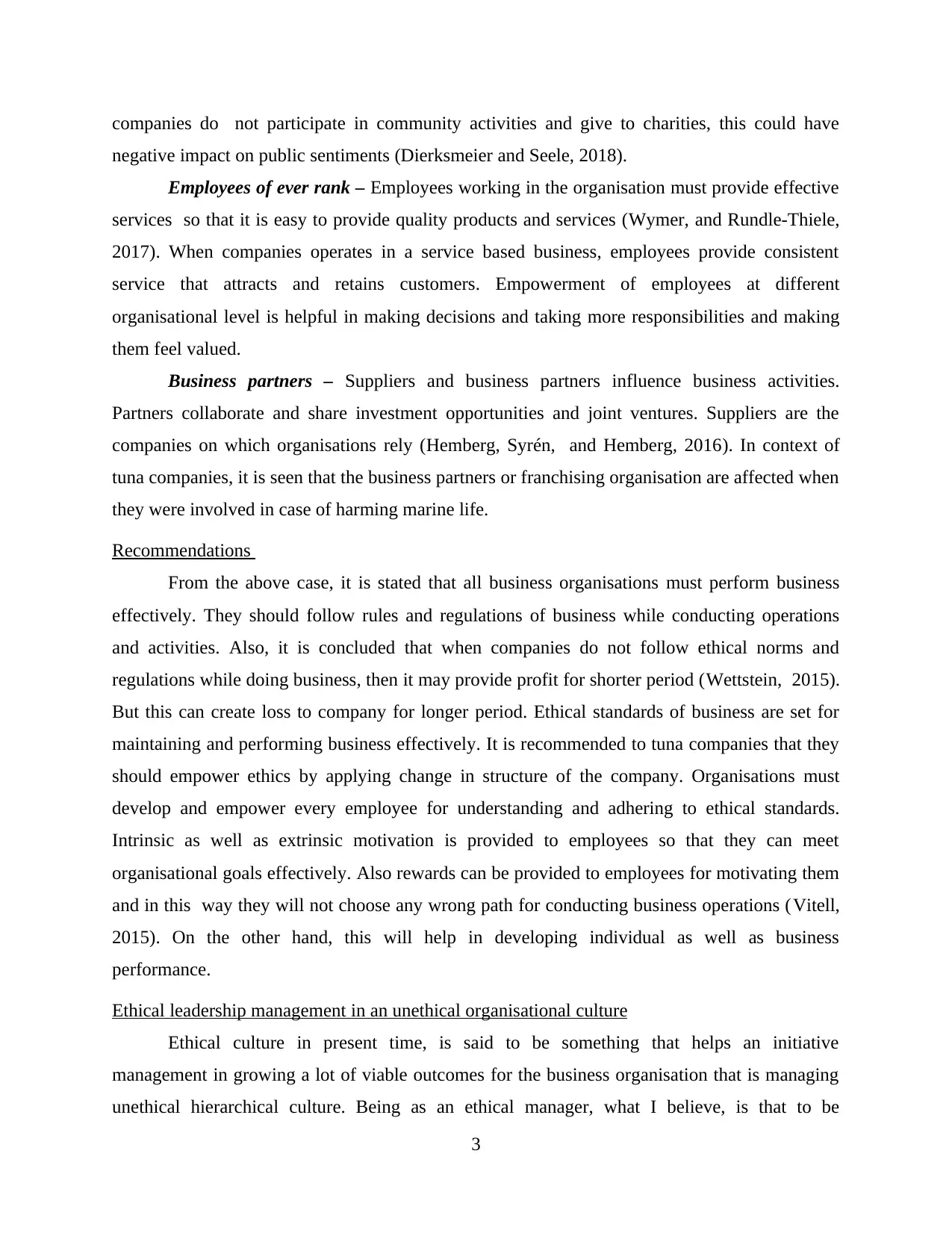
companies do not participate in community activities and give to charities, this could have
negative impact on public sentiments (Dierksmeier and Seele, 2018).
Employees of ever rank – Employees working in the organisation must provide effective
services so that it is easy to provide quality products and services (Wymer, and Rundle-Thiele,
2017). When companies operates in a service based business, employees provide consistent
service that attracts and retains customers. Empowerment of employees at different
organisational level is helpful in making decisions and taking more responsibilities and making
them feel valued.
Business partners – Suppliers and business partners influence business activities.
Partners collaborate and share investment opportunities and joint ventures. Suppliers are the
companies on which organisations rely (Hemberg, Syrén, and Hemberg, 2016). In context of
tuna companies, it is seen that the business partners or franchising organisation are affected when
they were involved in case of harming marine life.
Recommendations
From the above case, it is stated that all business organisations must perform business
effectively. They should follow rules and regulations of business while conducting operations
and activities. Also, it is concluded that when companies do not follow ethical norms and
regulations while doing business, then it may provide profit for shorter period (Wettstein, 2015).
But this can create loss to company for longer period. Ethical standards of business are set for
maintaining and performing business effectively. It is recommended to tuna companies that they
should empower ethics by applying change in structure of the company. Organisations must
develop and empower every employee for understanding and adhering to ethical standards.
Intrinsic as well as extrinsic motivation is provided to employees so that they can meet
organisational goals effectively. Also rewards can be provided to employees for motivating them
and in this way they will not choose any wrong path for conducting business operations (Vitell,
2015). On the other hand, this will help in developing individual as well as business
performance.
Ethical leadership management in an unethical organisational culture
Ethical culture in present time, is said to be something that helps an initiative
management in growing a lot of viable outcomes for the business organisation that is managing
unethical hierarchical culture. Being as an ethical manager, what I believe, is that to be
3
negative impact on public sentiments (Dierksmeier and Seele, 2018).
Employees of ever rank – Employees working in the organisation must provide effective
services so that it is easy to provide quality products and services (Wymer, and Rundle-Thiele,
2017). When companies operates in a service based business, employees provide consistent
service that attracts and retains customers. Empowerment of employees at different
organisational level is helpful in making decisions and taking more responsibilities and making
them feel valued.
Business partners – Suppliers and business partners influence business activities.
Partners collaborate and share investment opportunities and joint ventures. Suppliers are the
companies on which organisations rely (Hemberg, Syrén, and Hemberg, 2016). In context of
tuna companies, it is seen that the business partners or franchising organisation are affected when
they were involved in case of harming marine life.
Recommendations
From the above case, it is stated that all business organisations must perform business
effectively. They should follow rules and regulations of business while conducting operations
and activities. Also, it is concluded that when companies do not follow ethical norms and
regulations while doing business, then it may provide profit for shorter period (Wettstein, 2015).
But this can create loss to company for longer period. Ethical standards of business are set for
maintaining and performing business effectively. It is recommended to tuna companies that they
should empower ethics by applying change in structure of the company. Organisations must
develop and empower every employee for understanding and adhering to ethical standards.
Intrinsic as well as extrinsic motivation is provided to employees so that they can meet
organisational goals effectively. Also rewards can be provided to employees for motivating them
and in this way they will not choose any wrong path for conducting business operations (Vitell,
2015). On the other hand, this will help in developing individual as well as business
performance.
Ethical leadership management in an unethical organisational culture
Ethical culture in present time, is said to be something that helps an initiative
management in growing a lot of viable outcomes for the business organisation that is managing
unethical hierarchical culture. Being as an ethical manager, what I believe, is that to be
3
⊘ This is a preview!⊘
Do you want full access?
Subscribe today to unlock all pages.

Trusted by 1+ million students worldwide
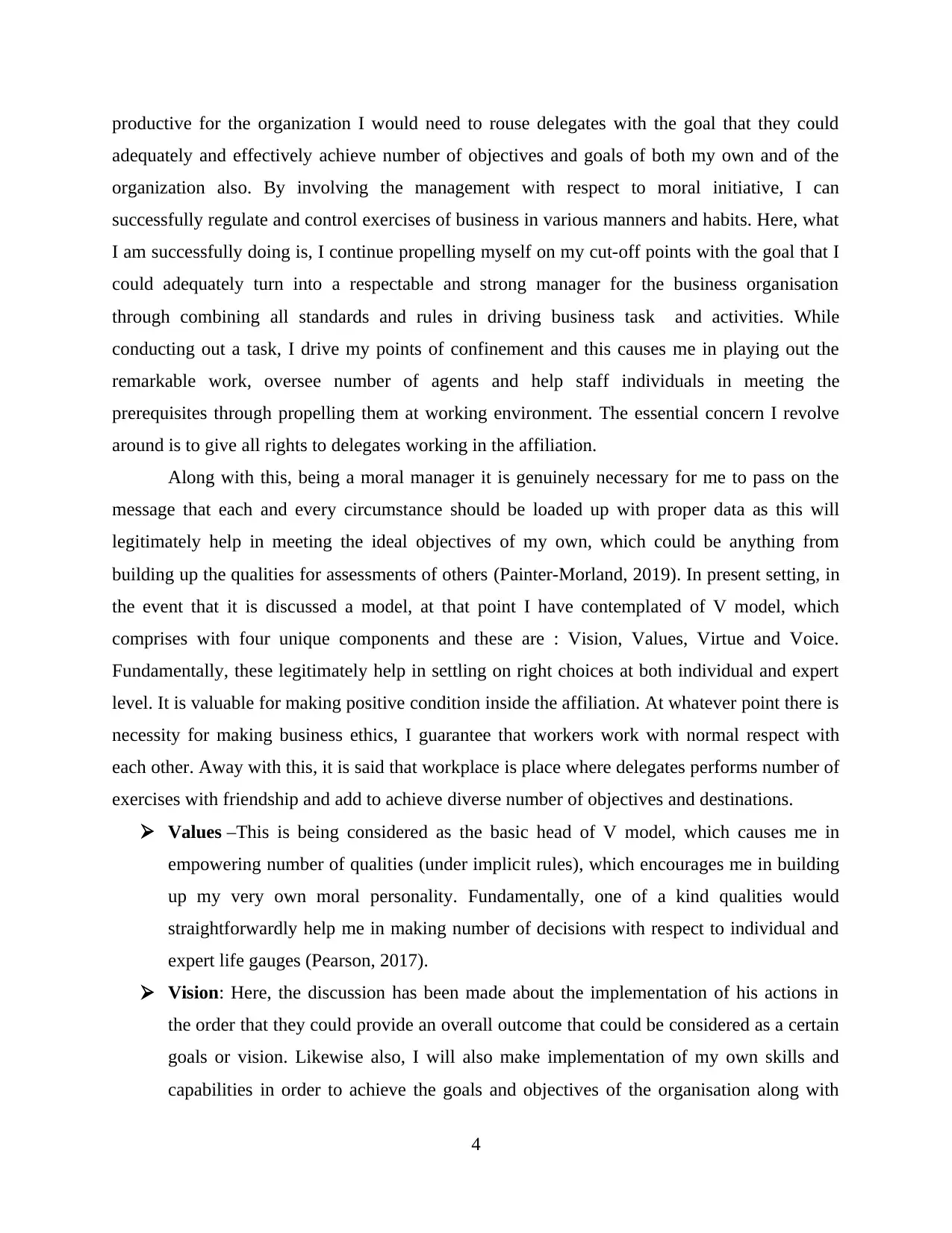
productive for the organization I would need to rouse delegates with the goal that they could
adequately and effectively achieve number of objectives and goals of both my own and of the
organization also. By involving the management with respect to moral initiative, I can
successfully regulate and control exercises of business in various manners and habits. Here, what
I am successfully doing is, I continue propelling myself on my cut-off points with the goal that I
could adequately turn into a respectable and strong manager for the business organisation
through combining all standards and rules in driving business task and activities. While
conducting out a task, I drive my points of confinement and this causes me in playing out the
remarkable work, oversee number of agents and help staff individuals in meeting the
prerequisites through propelling them at working environment. The essential concern I revolve
around is to give all rights to delegates working in the affiliation.
Along with this, being a moral manager it is genuinely necessary for me to pass on the
message that each and every circumstance should be loaded up with proper data as this will
legitimately help in meeting the ideal objectives of my own, which could be anything from
building up the qualities for assessments of others (Painter-Morland, 2019). In present setting, in
the event that it is discussed a model, at that point I have contemplated of V model, which
comprises with four unique components and these are : Vision, Values, Virtue and Voice.
Fundamentally, these legitimately help in settling on right choices at both individual and expert
level. It is valuable for making positive condition inside the affiliation. At whatever point there is
necessity for making business ethics, I guarantee that workers work with normal respect with
each other. Away with this, it is said that workplace is place where delegates performs number of
exercises with friendship and add to achieve diverse number of objectives and destinations.
Values –This is being considered as the basic head of V model, which causes me in
empowering number of qualities (under implicit rules), which encourages me in building
up my very own moral personality. Fundamentally, one of a kind qualities would
straightforwardly help me in making number of decisions with respect to individual and
expert life gauges (Pearson, 2017).
Vision: Here, the discussion has been made about the implementation of his actions in
the order that they could provide an overall outcome that could be considered as a certain
goals or vision. Likewise also, I will also make implementation of my own skills and
capabilities in order to achieve the goals and objectives of the organisation along with
4
adequately and effectively achieve number of objectives and goals of both my own and of the
organization also. By involving the management with respect to moral initiative, I can
successfully regulate and control exercises of business in various manners and habits. Here, what
I am successfully doing is, I continue propelling myself on my cut-off points with the goal that I
could adequately turn into a respectable and strong manager for the business organisation
through combining all standards and rules in driving business task and activities. While
conducting out a task, I drive my points of confinement and this causes me in playing out the
remarkable work, oversee number of agents and help staff individuals in meeting the
prerequisites through propelling them at working environment. The essential concern I revolve
around is to give all rights to delegates working in the affiliation.
Along with this, being a moral manager it is genuinely necessary for me to pass on the
message that each and every circumstance should be loaded up with proper data as this will
legitimately help in meeting the ideal objectives of my own, which could be anything from
building up the qualities for assessments of others (Painter-Morland, 2019). In present setting, in
the event that it is discussed a model, at that point I have contemplated of V model, which
comprises with four unique components and these are : Vision, Values, Virtue and Voice.
Fundamentally, these legitimately help in settling on right choices at both individual and expert
level. It is valuable for making positive condition inside the affiliation. At whatever point there is
necessity for making business ethics, I guarantee that workers work with normal respect with
each other. Away with this, it is said that workplace is place where delegates performs number of
exercises with friendship and add to achieve diverse number of objectives and destinations.
Values –This is being considered as the basic head of V model, which causes me in
empowering number of qualities (under implicit rules), which encourages me in building
up my very own moral personality. Fundamentally, one of a kind qualities would
straightforwardly help me in making number of decisions with respect to individual and
expert life gauges (Pearson, 2017).
Vision: Here, the discussion has been made about the implementation of his actions in
the order that they could provide an overall outcome that could be considered as a certain
goals or vision. Likewise also, I will also make implementation of my own skills and
capabilities in order to achieve the goals and objectives of the organisation along with
4
Paraphrase This Document
Need a fresh take? Get an instant paraphrase of this document with our AI Paraphraser
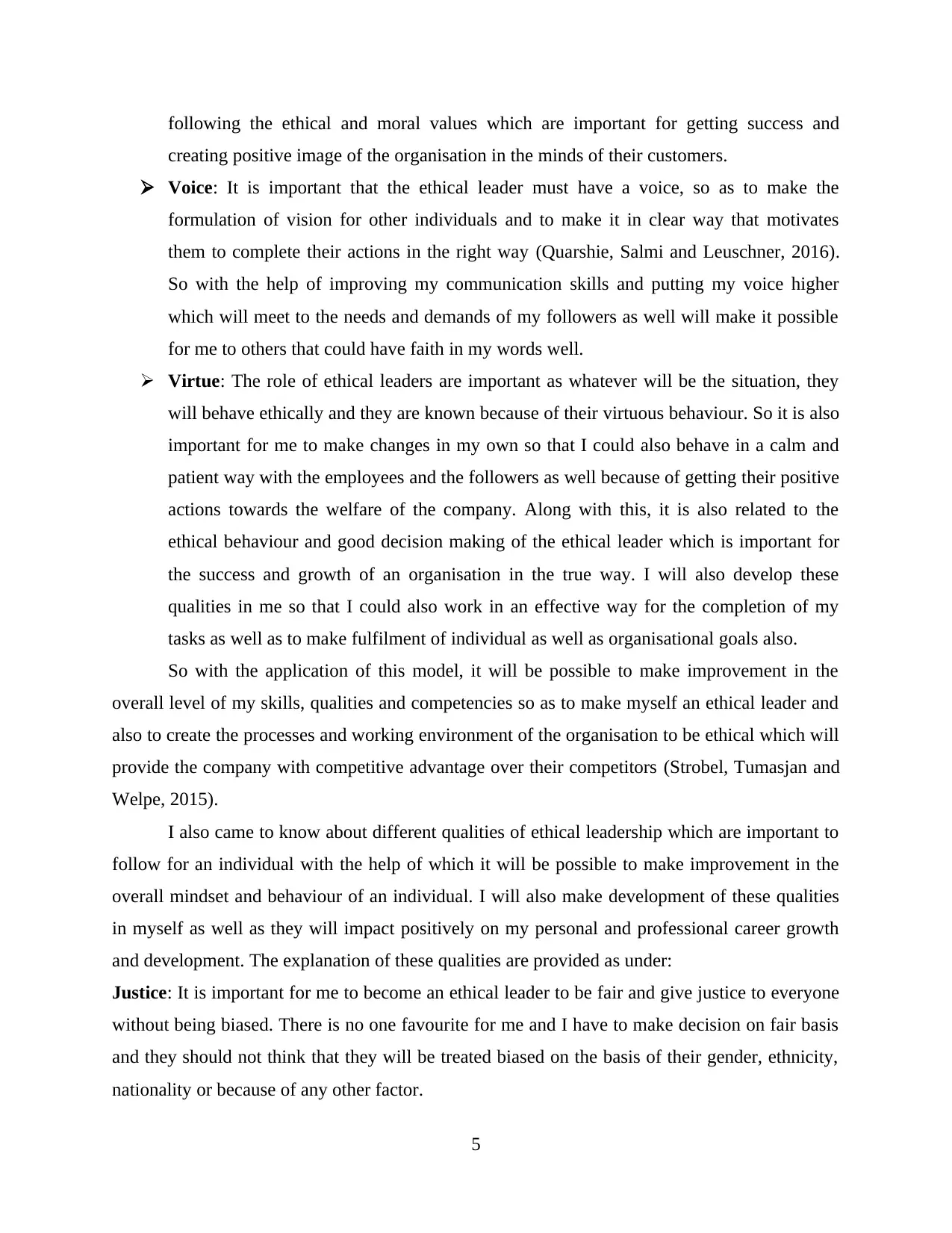
following the ethical and moral values which are important for getting success and
creating positive image of the organisation in the minds of their customers.
Voice: It is important that the ethical leader must have a voice, so as to make the
formulation of vision for other individuals and to make it in clear way that motivates
them to complete their actions in the right way (Quarshie, Salmi and Leuschner, 2016).
So with the help of improving my communication skills and putting my voice higher
which will meet to the needs and demands of my followers as well will make it possible
for me to others that could have faith in my words well.
Virtue: The role of ethical leaders are important as whatever will be the situation, they
will behave ethically and they are known because of their virtuous behaviour. So it is also
important for me to make changes in my own so that I could also behave in a calm and
patient way with the employees and the followers as well because of getting their positive
actions towards the welfare of the company. Along with this, it is also related to the
ethical behaviour and good decision making of the ethical leader which is important for
the success and growth of an organisation in the true way. I will also develop these
qualities in me so that I could also work in an effective way for the completion of my
tasks as well as to make fulfilment of individual as well as organisational goals also.
So with the application of this model, it will be possible to make improvement in the
overall level of my skills, qualities and competencies so as to make myself an ethical leader and
also to create the processes and working environment of the organisation to be ethical which will
provide the company with competitive advantage over their competitors (Strobel, Tumasjan and
Welpe, 2015).
I also came to know about different qualities of ethical leadership which are important to
follow for an individual with the help of which it will be possible to make improvement in the
overall mindset and behaviour of an individual. I will also make development of these qualities
in myself as well as they will impact positively on my personal and professional career growth
and development. The explanation of these qualities are provided as under:
Justice: It is important for me to become an ethical leader to be fair and give justice to everyone
without being biased. There is no one favourite for me and I have to make decision on fair basis
and they should not think that they will be treated biased on the basis of their gender, ethnicity,
nationality or because of any other factor.
5
creating positive image of the organisation in the minds of their customers.
Voice: It is important that the ethical leader must have a voice, so as to make the
formulation of vision for other individuals and to make it in clear way that motivates
them to complete their actions in the right way (Quarshie, Salmi and Leuschner, 2016).
So with the help of improving my communication skills and putting my voice higher
which will meet to the needs and demands of my followers as well will make it possible
for me to others that could have faith in my words well.
Virtue: The role of ethical leaders are important as whatever will be the situation, they
will behave ethically and they are known because of their virtuous behaviour. So it is also
important for me to make changes in my own so that I could also behave in a calm and
patient way with the employees and the followers as well because of getting their positive
actions towards the welfare of the company. Along with this, it is also related to the
ethical behaviour and good decision making of the ethical leader which is important for
the success and growth of an organisation in the true way. I will also develop these
qualities in me so that I could also work in an effective way for the completion of my
tasks as well as to make fulfilment of individual as well as organisational goals also.
So with the application of this model, it will be possible to make improvement in the
overall level of my skills, qualities and competencies so as to make myself an ethical leader and
also to create the processes and working environment of the organisation to be ethical which will
provide the company with competitive advantage over their competitors (Strobel, Tumasjan and
Welpe, 2015).
I also came to know about different qualities of ethical leadership which are important to
follow for an individual with the help of which it will be possible to make improvement in the
overall mindset and behaviour of an individual. I will also make development of these qualities
in myself as well as they will impact positively on my personal and professional career growth
and development. The explanation of these qualities are provided as under:
Justice: It is important for me to become an ethical leader to be fair and give justice to everyone
without being biased. There is no one favourite for me and I have to make decision on fair basis
and they should not think that they will be treated biased on the basis of their gender, ethnicity,
nationality or because of any other factor.
5
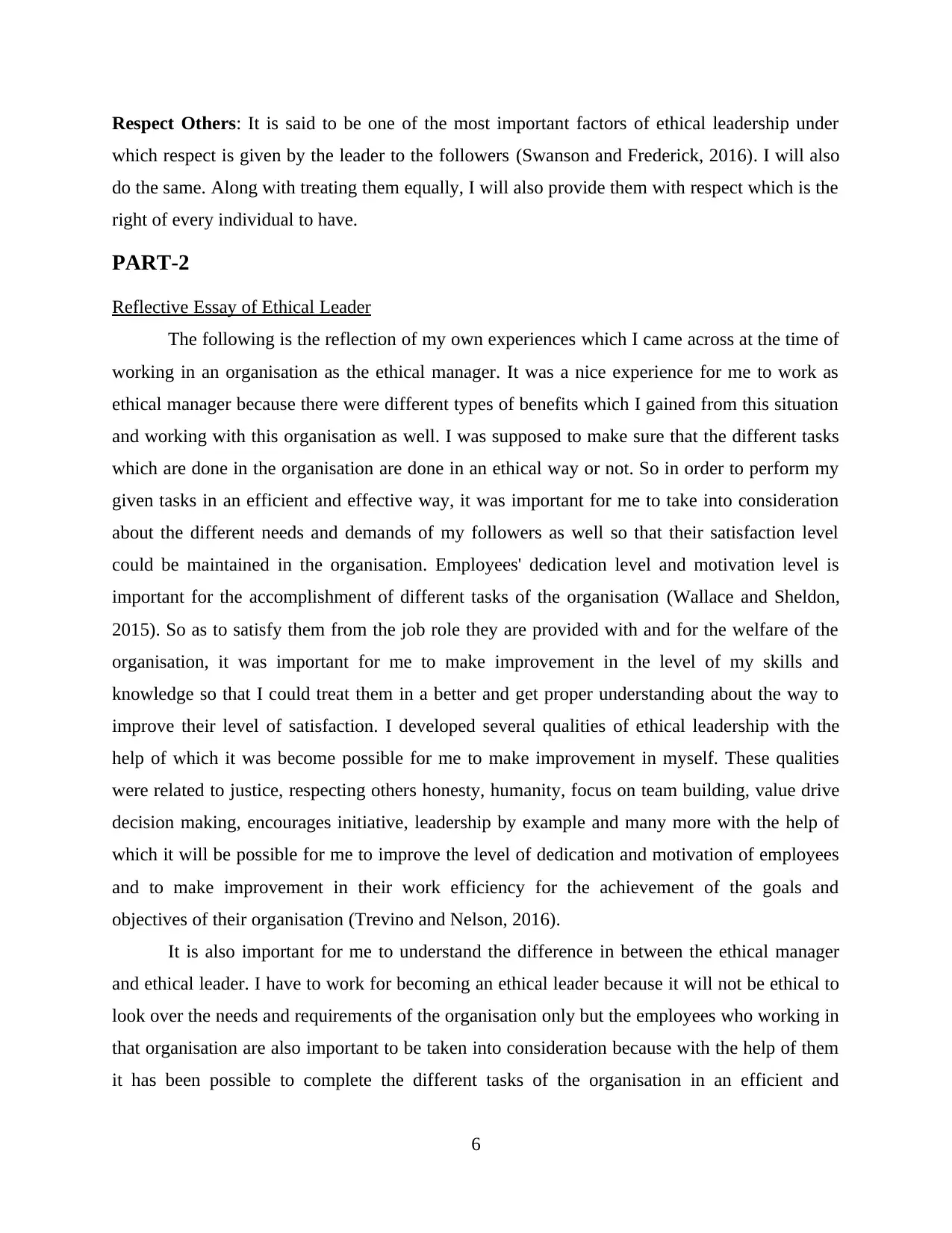
Respect Others: It is said to be one of the most important factors of ethical leadership under
which respect is given by the leader to the followers (Swanson and Frederick, 2016). I will also
do the same. Along with treating them equally, I will also provide them with respect which is the
right of every individual to have.
PART-2
Reflective Essay of Ethical Leader
The following is the reflection of my own experiences which I came across at the time of
working in an organisation as the ethical manager. It was a nice experience for me to work as
ethical manager because there were different types of benefits which I gained from this situation
and working with this organisation as well. I was supposed to make sure that the different tasks
which are done in the organisation are done in an ethical way or not. So in order to perform my
given tasks in an efficient and effective way, it was important for me to take into consideration
about the different needs and demands of my followers as well so that their satisfaction level
could be maintained in the organisation. Employees' dedication level and motivation level is
important for the accomplishment of different tasks of the organisation (Wallace and Sheldon,
2015). So as to satisfy them from the job role they are provided with and for the welfare of the
organisation, it was important for me to make improvement in the level of my skills and
knowledge so that I could treat them in a better and get proper understanding about the way to
improve their level of satisfaction. I developed several qualities of ethical leadership with the
help of which it was become possible for me to make improvement in myself. These qualities
were related to justice, respecting others honesty, humanity, focus on team building, value drive
decision making, encourages initiative, leadership by example and many more with the help of
which it will be possible for me to improve the level of dedication and motivation of employees
and to make improvement in their work efficiency for the achievement of the goals and
objectives of their organisation (Trevino and Nelson, 2016).
It is also important for me to understand the difference in between the ethical manager
and ethical leader. I have to work for becoming an ethical leader because it will not be ethical to
look over the needs and requirements of the organisation only but the employees who working in
that organisation are also important to be taken into consideration because with the help of them
it has been possible to complete the different tasks of the organisation in an efficient and
6
which respect is given by the leader to the followers (Swanson and Frederick, 2016). I will also
do the same. Along with treating them equally, I will also provide them with respect which is the
right of every individual to have.
PART-2
Reflective Essay of Ethical Leader
The following is the reflection of my own experiences which I came across at the time of
working in an organisation as the ethical manager. It was a nice experience for me to work as
ethical manager because there were different types of benefits which I gained from this situation
and working with this organisation as well. I was supposed to make sure that the different tasks
which are done in the organisation are done in an ethical way or not. So in order to perform my
given tasks in an efficient and effective way, it was important for me to take into consideration
about the different needs and demands of my followers as well so that their satisfaction level
could be maintained in the organisation. Employees' dedication level and motivation level is
important for the accomplishment of different tasks of the organisation (Wallace and Sheldon,
2015). So as to satisfy them from the job role they are provided with and for the welfare of the
organisation, it was important for me to make improvement in the level of my skills and
knowledge so that I could treat them in a better and get proper understanding about the way to
improve their level of satisfaction. I developed several qualities of ethical leadership with the
help of which it was become possible for me to make improvement in myself. These qualities
were related to justice, respecting others honesty, humanity, focus on team building, value drive
decision making, encourages initiative, leadership by example and many more with the help of
which it will be possible for me to improve the level of dedication and motivation of employees
and to make improvement in their work efficiency for the achievement of the goals and
objectives of their organisation (Trevino and Nelson, 2016).
It is also important for me to understand the difference in between the ethical manager
and ethical leader. I have to work for becoming an ethical leader because it will not be ethical to
look over the needs and requirements of the organisation only but the employees who working in
that organisation are also important to be taken into consideration because with the help of them
it has been possible to complete the different tasks of the organisation in an efficient and
6
⊘ This is a preview!⊘
Do you want full access?
Subscribe today to unlock all pages.

Trusted by 1+ million students worldwide
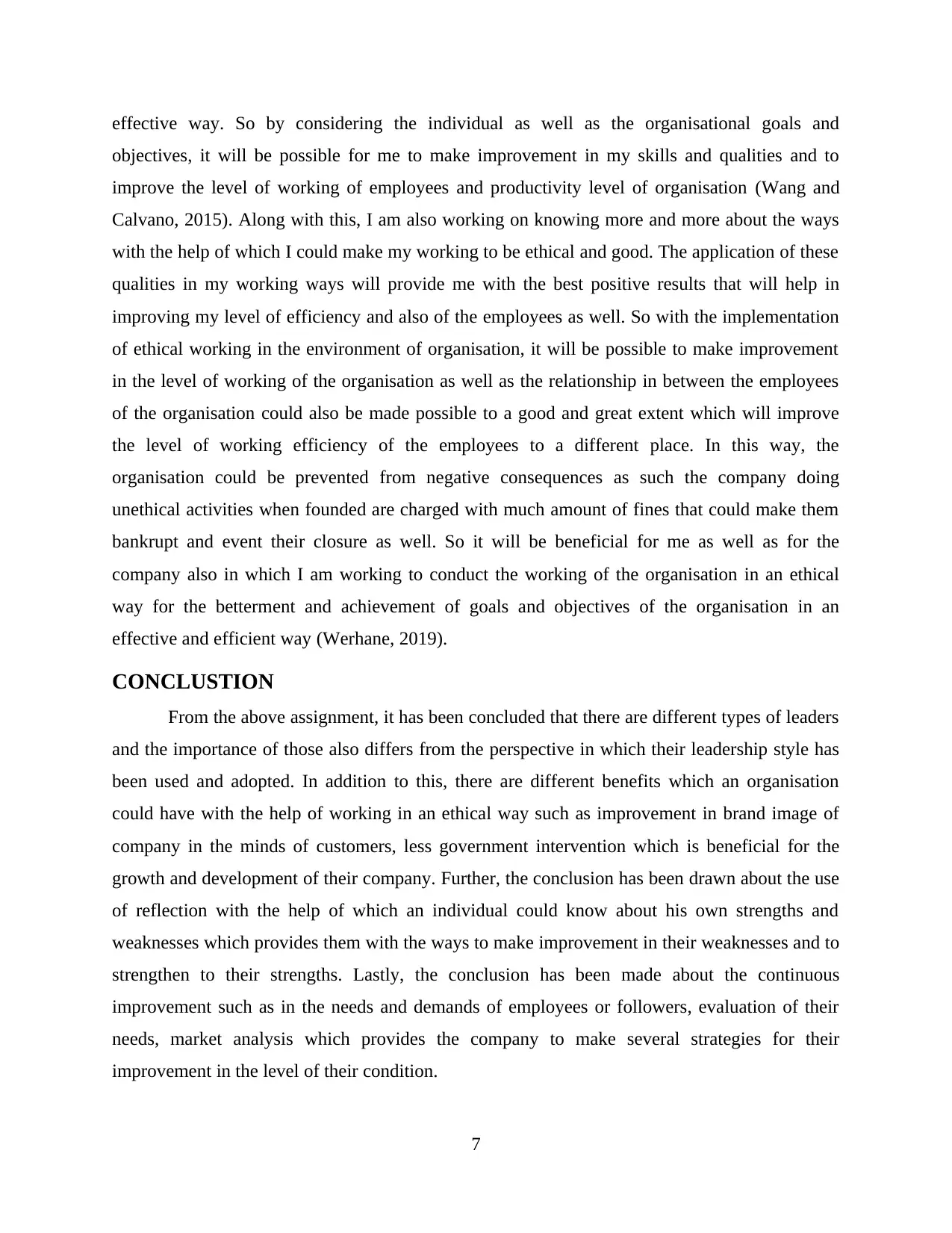
effective way. So by considering the individual as well as the organisational goals and
objectives, it will be possible for me to make improvement in my skills and qualities and to
improve the level of working of employees and productivity level of organisation (Wang and
Calvano, 2015). Along with this, I am also working on knowing more and more about the ways
with the help of which I could make my working to be ethical and good. The application of these
qualities in my working ways will provide me with the best positive results that will help in
improving my level of efficiency and also of the employees as well. So with the implementation
of ethical working in the environment of organisation, it will be possible to make improvement
in the level of working of the organisation as well as the relationship in between the employees
of the organisation could also be made possible to a good and great extent which will improve
the level of working efficiency of the employees to a different place. In this way, the
organisation could be prevented from negative consequences as such the company doing
unethical activities when founded are charged with much amount of fines that could make them
bankrupt and event their closure as well. So it will be beneficial for me as well as for the
company also in which I am working to conduct the working of the organisation in an ethical
way for the betterment and achievement of goals and objectives of the organisation in an
effective and efficient way (Werhane, 2019).
CONCLUSTION
From the above assignment, it has been concluded that there are different types of leaders
and the importance of those also differs from the perspective in which their leadership style has
been used and adopted. In addition to this, there are different benefits which an organisation
could have with the help of working in an ethical way such as improvement in brand image of
company in the minds of customers, less government intervention which is beneficial for the
growth and development of their company. Further, the conclusion has been drawn about the use
of reflection with the help of which an individual could know about his own strengths and
weaknesses which provides them with the ways to make improvement in their weaknesses and to
strengthen to their strengths. Lastly, the conclusion has been made about the continuous
improvement such as in the needs and demands of employees or followers, evaluation of their
needs, market analysis which provides the company to make several strategies for their
improvement in the level of their condition.
7
objectives, it will be possible for me to make improvement in my skills and qualities and to
improve the level of working of employees and productivity level of organisation (Wang and
Calvano, 2015). Along with this, I am also working on knowing more and more about the ways
with the help of which I could make my working to be ethical and good. The application of these
qualities in my working ways will provide me with the best positive results that will help in
improving my level of efficiency and also of the employees as well. So with the implementation
of ethical working in the environment of organisation, it will be possible to make improvement
in the level of working of the organisation as well as the relationship in between the employees
of the organisation could also be made possible to a good and great extent which will improve
the level of working efficiency of the employees to a different place. In this way, the
organisation could be prevented from negative consequences as such the company doing
unethical activities when founded are charged with much amount of fines that could make them
bankrupt and event their closure as well. So it will be beneficial for me as well as for the
company also in which I am working to conduct the working of the organisation in an ethical
way for the betterment and achievement of goals and objectives of the organisation in an
effective and efficient way (Werhane, 2019).
CONCLUSTION
From the above assignment, it has been concluded that there are different types of leaders
and the importance of those also differs from the perspective in which their leadership style has
been used and adopted. In addition to this, there are different benefits which an organisation
could have with the help of working in an ethical way such as improvement in brand image of
company in the minds of customers, less government intervention which is beneficial for the
growth and development of their company. Further, the conclusion has been drawn about the use
of reflection with the help of which an individual could know about his own strengths and
weaknesses which provides them with the ways to make improvement in their weaknesses and to
strengthen to their strengths. Lastly, the conclusion has been made about the continuous
improvement such as in the needs and demands of employees or followers, evaluation of their
needs, market analysis which provides the company to make several strategies for their
improvement in the level of their condition.
7
Paraphrase This Document
Need a fresh take? Get an instant paraphrase of this document with our AI Paraphraser
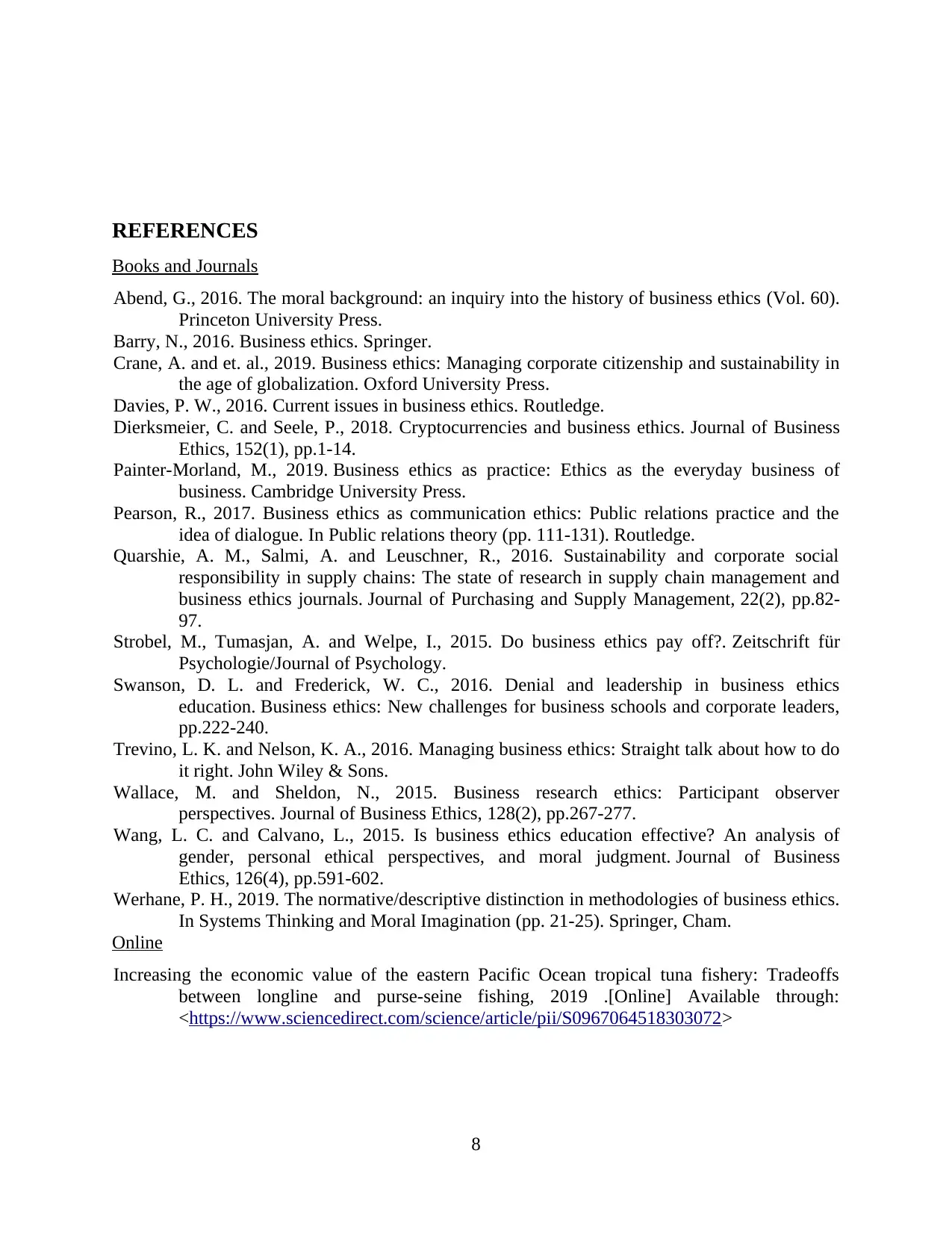
REFERENCES
Books and Journals
Abend, G., 2016. The moral background: an inquiry into the history of business ethics (Vol. 60).
Princeton University Press.
Barry, N., 2016. Business ethics. Springer.
Crane, A. and et. al., 2019. Business ethics: Managing corporate citizenship and sustainability in
the age of globalization. Oxford University Press.
Davies, P. W., 2016. Current issues in business ethics. Routledge.
Dierksmeier, C. and Seele, P., 2018. Cryptocurrencies and business ethics. Journal of Business
Ethics, 152(1), pp.1-14.
Painter-Morland, M., 2019. Business ethics as practice: Ethics as the everyday business of
business. Cambridge University Press.
Pearson, R., 2017. Business ethics as communication ethics: Public relations practice and the
idea of dialogue. In Public relations theory (pp. 111-131). Routledge.
Quarshie, A. M., Salmi, A. and Leuschner, R., 2016. Sustainability and corporate social
responsibility in supply chains: The state of research in supply chain management and
business ethics journals. Journal of Purchasing and Supply Management, 22(2), pp.82-
97.
Strobel, M., Tumasjan, A. and Welpe, I., 2015. Do business ethics pay off?. Zeitschrift für
Psychologie/Journal of Psychology.
Swanson, D. L. and Frederick, W. C., 2016. Denial and leadership in business ethics
education. Business ethics: New challenges for business schools and corporate leaders,
pp.222-240.
Trevino, L. K. and Nelson, K. A., 2016. Managing business ethics: Straight talk about how to do
it right. John Wiley & Sons.
Wallace, M. and Sheldon, N., 2015. Business research ethics: Participant observer
perspectives. Journal of Business Ethics, 128(2), pp.267-277.
Wang, L. C. and Calvano, L., 2015. Is business ethics education effective? An analysis of
gender, personal ethical perspectives, and moral judgment. Journal of Business
Ethics, 126(4), pp.591-602.
Werhane, P. H., 2019. The normative/descriptive distinction in methodologies of business ethics.
In Systems Thinking and Moral Imagination (pp. 21-25). Springer, Cham.
Online
Increasing the economic value of the eastern Pacific Ocean tropical tuna fishery: Tradeoffs
between longline and purse-seine fishing, 2019 .[Online] Available through:
<https://www.sciencedirect.com/science/article/pii/S0967064518303072>
8
Books and Journals
Abend, G., 2016. The moral background: an inquiry into the history of business ethics (Vol. 60).
Princeton University Press.
Barry, N., 2016. Business ethics. Springer.
Crane, A. and et. al., 2019. Business ethics: Managing corporate citizenship and sustainability in
the age of globalization. Oxford University Press.
Davies, P. W., 2016. Current issues in business ethics. Routledge.
Dierksmeier, C. and Seele, P., 2018. Cryptocurrencies and business ethics. Journal of Business
Ethics, 152(1), pp.1-14.
Painter-Morland, M., 2019. Business ethics as practice: Ethics as the everyday business of
business. Cambridge University Press.
Pearson, R., 2017. Business ethics as communication ethics: Public relations practice and the
idea of dialogue. In Public relations theory (pp. 111-131). Routledge.
Quarshie, A. M., Salmi, A. and Leuschner, R., 2016. Sustainability and corporate social
responsibility in supply chains: The state of research in supply chain management and
business ethics journals. Journal of Purchasing and Supply Management, 22(2), pp.82-
97.
Strobel, M., Tumasjan, A. and Welpe, I., 2015. Do business ethics pay off?. Zeitschrift für
Psychologie/Journal of Psychology.
Swanson, D. L. and Frederick, W. C., 2016. Denial and leadership in business ethics
education. Business ethics: New challenges for business schools and corporate leaders,
pp.222-240.
Trevino, L. K. and Nelson, K. A., 2016. Managing business ethics: Straight talk about how to do
it right. John Wiley & Sons.
Wallace, M. and Sheldon, N., 2015. Business research ethics: Participant observer
perspectives. Journal of Business Ethics, 128(2), pp.267-277.
Wang, L. C. and Calvano, L., 2015. Is business ethics education effective? An analysis of
gender, personal ethical perspectives, and moral judgment. Journal of Business
Ethics, 126(4), pp.591-602.
Werhane, P. H., 2019. The normative/descriptive distinction in methodologies of business ethics.
In Systems Thinking and Moral Imagination (pp. 21-25). Springer, Cham.
Online
Increasing the economic value of the eastern Pacific Ocean tropical tuna fishery: Tradeoffs
between longline and purse-seine fishing, 2019 .[Online] Available through:
<https://www.sciencedirect.com/science/article/pii/S0967064518303072>
8
1 out of 11
Related Documents
Your All-in-One AI-Powered Toolkit for Academic Success.
+13062052269
info@desklib.com
Available 24*7 on WhatsApp / Email
![[object Object]](/_next/static/media/star-bottom.7253800d.svg)
Unlock your academic potential
Copyright © 2020–2025 A2Z Services. All Rights Reserved. Developed and managed by ZUCOL.





